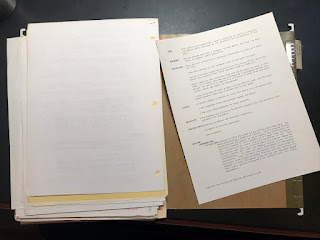I had scheduled for last Thursday to write on a question I am asked in my seminars, “What is the best Bible for me to use.” It is a great question, for which I have a detailed answer. However, some things changed Thursday…

That last Monday (4/20) I had a PET scan. It was supposed to be done in Houston but because of the virus, the trip to MD Anderson was canceled and I was instructed to get it here. Wednesday, I met with the MD Anderson oncologist by video conference, we had sent her the disc overnight, but she did not have it yet. That afternoon I met with the oncologist here and we went over the scan. There were some changes, there is one lymph node that she had been watching. It seemed to have grown.
The one thing that was weird, there were some liver numbers that were weird. So, she asked me to check with the infectious disease doctor… So, Thursday morning, we met on video. He wondered if the numbers were messed up due to exercise. I was planning to ride 23 miles later that day, the doctor told me to get blood redrawn on Friday.
Did not make the 23-mile ride. Back tire blew at 13. Could not get the pump to work, that is another story… My son had to come get me. He got me back to the car and just as I was moving my bike from his bike rack to mine, MD Anderson called.
They had looked at the PET scan and had determined the lymph node they had been watching had grown to the point that we needed to start treatment. The oncologists and the infectious disease doc spoke on Friday morning and I got a long message outline what was going to happen.
I got a port yesterday, an echo cardiogram today, and met with the oncologist here to get the details of the treatment late this afternoon. Next Monday I get a bone marrow biopsy, and the week of the 11th I will start treatment.
I have a lot more to share about this, some things that the Lord has already taught me. But our schedule has been radically changed. I was going to Togo the first week of June, and Jenny and I were going to South Africa in July. Not now.
One thing of note. On Wednesday, tomorrow night. I will be speaking at our church online (full disclosure, I recorded this at our home on Saturday). The session starts at 6:30 PM CDT, and you can watch it either at the church website or on the church Facebook page. I am talking about the need to personally engage in the scripture. The outline is:

That last Monday (4/20) I had a PET scan. It was supposed to be done in Houston but because of the virus, the trip to MD Anderson was canceled and I was instructed to get it here. Wednesday, I met with the MD Anderson oncologist by video conference, we had sent her the disc overnight, but she did not have it yet. That afternoon I met with the oncologist here and we went over the scan. There were some changes, there is one lymph node that she had been watching. It seemed to have grown.
The one thing that was weird, there were some liver numbers that were weird. So, she asked me to check with the infectious disease doctor… So, Thursday morning, we met on video. He wondered if the numbers were messed up due to exercise. I was planning to ride 23 miles later that day, the doctor told me to get blood redrawn on Friday.
Did not make the 23-mile ride. Back tire blew at 13. Could not get the pump to work, that is another story… My son had to come get me. He got me back to the car and just as I was moving my bike from his bike rack to mine, MD Anderson called.
They had looked at the PET scan and had determined the lymph node they had been watching had grown to the point that we needed to start treatment. The oncologists and the infectious disease doc spoke on Friday morning and I got a long message outline what was going to happen.
I got a port yesterday, an echo cardiogram today, and met with the oncologist here to get the details of the treatment late this afternoon. Next Monday I get a bone marrow biopsy, and the week of the 11th I will start treatment.
I have a lot more to share about this, some things that the Lord has already taught me. But our schedule has been radically changed. I was going to Togo the first week of June, and Jenny and I were going to South Africa in July. Not now.
One thing of note. On Wednesday, tomorrow night. I will be speaking at our church online (full disclosure, I recorded this at our home on Saturday). The session starts at 6:30 PM CDT, and you can watch it either at the church website or on the church Facebook page. I am talking about the need to personally engage in the scripture. The outline is:
- What are the ways we can engage?
- Why it is critical for each of us to engage.
- Some ideas on how to start or keep going.




